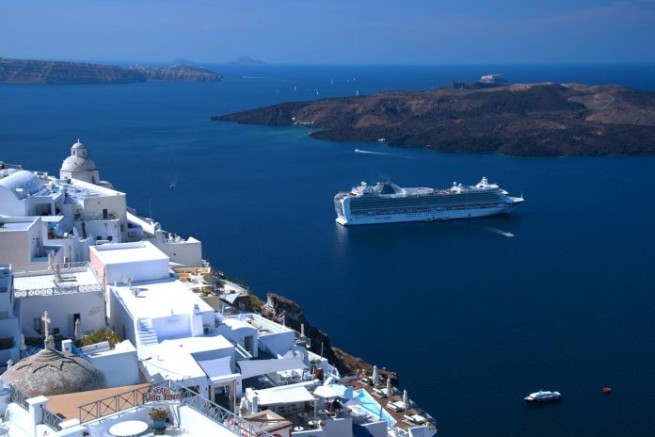The news of the death of the great Greek musician and world-famous composer causes sadness in the art world and beyond.
As it became known, the Greek musician and composer of electronic, progressive, ambient, jazz and orchestral music, Vangelis Papathanasiou also known as Vangeliswas hospitalized in France with the coronavirus.
The news was confirmed by the law firm representing Vangelis Papatanasiou. “It is with great sadness that we announce that the great Greek Vangelis Papathanasiou passed away late at night on Tuesday, May 17,” the message reads.
Who was Vangelis Papatanasiou?
Vangelis Papathanasiou (full name: Evangelos Odysseus Papathanasiou), better known as Vangelis, was a Greek musician and composer of electronic, progressive, ambient, jazz and orchestral music. He influenced the development of various musical genres, while he is considered a pioneer of electronic sound. He won an Oscar for his score for the 1982 film Roads of Fire.
He also composed music for many other films such as Blade Runner, 1492: Christopher Columbus, Alexander, El Greco and others. He has collaborated with Demis Russo, Irene Pappas and John Anderson.
In 1997, he directed the opening ceremony of the 6th IAAF World Open Championships in Athletics at the Panathinaikos Stadium in Athens.
Mythodia’s work was selected by NASA as the official music for his mission: 2001 Odyssey to Mars, and in 2002 he created the official music for the 2002 FIFA World Cup in Korea and Japan.
Vangelis Papathanasiou was born on March 29, 1943 in Agria, Volos. The musical talents of the young Vangelis became apparent already at the age of 4, and for the first time his music was heard from the stage when he was 6 years old. However, when the parents tried to give the boy a professional musical education, it turned out that he did not submit to formal education, because he did not want to follow any instructions. At the same time, in the future, he warmly recalled his mother, who was especially persistent in trying to get the boy to play the piano.
The fascist coup of the “black colonels” (1967) found Vangelis in Paris, where he and his friends Demis Roussos and Lucas Sideras studied at the Sorbonne, just during the student revolution of 1968. The decision not to return to their homeland was made unanimously … But the trio, who remained patriots of Greece, decided to write the name of their native country in the history of music: this is how a new group was born, called “Aphrodite’s Child” (“Child of Aphrodite”)[3]. But all three gravitated towards opposite directions. In this difference of views and tastes, the unique sound of the group was born. Vangelis was interested in a different direction of music, which was then called “progressive” – complex instrumental music using a large number of advanced synthesizers and other electronic instruments of the era; in fact, he became one of the pioneers in this field. He became an informal creative leader of the team, determined its direct course. At first, the team experimented in sound, tried different formats, but soon came to the final formula, where Vangelis sat down at the keyboard (mainly electric organ) accompaniment.
Their very first single “Rain and Tears” (“Rain and Tears”) brought them worldwide popularity, and in the future, all released singles for three years invariably took first place in the European charts.
In 1971, having increased their instrumental capabilities with the inclusion of guitarist and drummer Silver Coulouris, they recorded the electronic oratorio “666 – Apocalypse of John” on a double album with the clear leadership of Vangelis. The group disbanded after the release of this album.
In 1970, he first had the opportunity to record on a record. The first disc of the young composer was the soundtrack to Henry Chapier’s film “Sex Power”. The film was shot in the genre of “light erotica”.
Several discs released over the two years were commercially unsuccessful. Later, Vangelis met and began working with the French director Frederic Rossif.
In 1974, Vangelis moved from Paris to London, where he was considered as a possible replacement for keyboardist Rick Wakeman in Yes. However, after two weeks of rehearsals, Vangelis left them, saying that his musical concept was too far from that of the band. It was during these two weeks that he became friends with the lead singer of Yes, John Anderson, which ensured their subsequent joint work.
In 1975, Vangelis signed with RCA and founded his own recording studio, Nemo Studios, which Vangelis later refers to as his research lab. Here he began recording a series of electronic albums such as Heaven and Hell (1975), Albedo 0.39 (1976), Spiral (1977), Beaubourg (1978) and China (1979). Parts from Heaven and Hell were subsequently used as the main theme in Carl Sagan’s television series Cosmos.
In the late 70s and early 80s, Vangelis devoted a lot of time to joint projects. Together with Jon Anderson, he records four successful albums under the label “Jon And Vangelis”, records two albums of “old” Greek hymns with Irene Papas (released only in Greece), produces records of Demis Roussos.
British director Anthony Thomas in 1980 made the film “Death of a Princess”, in which he used the composition “Alpha”.
In 1981, the film “Chariots of Fire” was released with music by Vangelis. For this music, he was awarded the Oscar and Grammy awards. The album’s title track became the only Greek song in history to top the US national charts. In 1982, he wrote the score for the film Blade Runner (directed by Ridley Scott). In 1984, Vangelis collaborated on a New Age album with Susan Chani.
In addition to these works, he released an album of academic music “Invisible Connections” (“Invisible connections”), and in 1985 – an album of symphonic and choral music “The Mask” (“Mask”), in 1992 he was nominated for the Golden Globe” in the category “Best Music for the Film” “1492: The Conquest of Paradise”.
In 1993, he composed the vocal symphony “Mythodea”, which in 2001 became the official music of NASA’s Mars Odyssey mission and was performed at the Temple of Zeus in Athens as part of the “cultural Olympiad” on the eve of the 2004 Olympics.
In 1996, Vangelis wrote soundtracks for one of the films “Underwater Odyssey” by Jacques Cousteau, but after listening to the material, he refuses to take the music for the film with the words: “No one will watch my film, everyone will listen only to your music.” This is how the album “Oceanic” appears[11]. In the fall of 1998, Vangelis released a new album, El Greco.
In 2002, Vangelis became the author of the anthem of the World Cup in Japan and Korea.
Vangelis returned after 20 years of emigration to Greece. He was entrusted with creating music for the most significant festivities – such as the opening of the Olympic Games in Athens. Ballets by Vangelis are performed on the stage – not only in Greece, but also abroad.






More Stories
Metropolitan Chrysostom: "The Church will never recognize same-sex marriage – the issue is not closed"
Schools in Germany: convert to Islam so as not to be an outsider
On this day in 1896, a statue was found in Delphi "Delphic Charioteer"